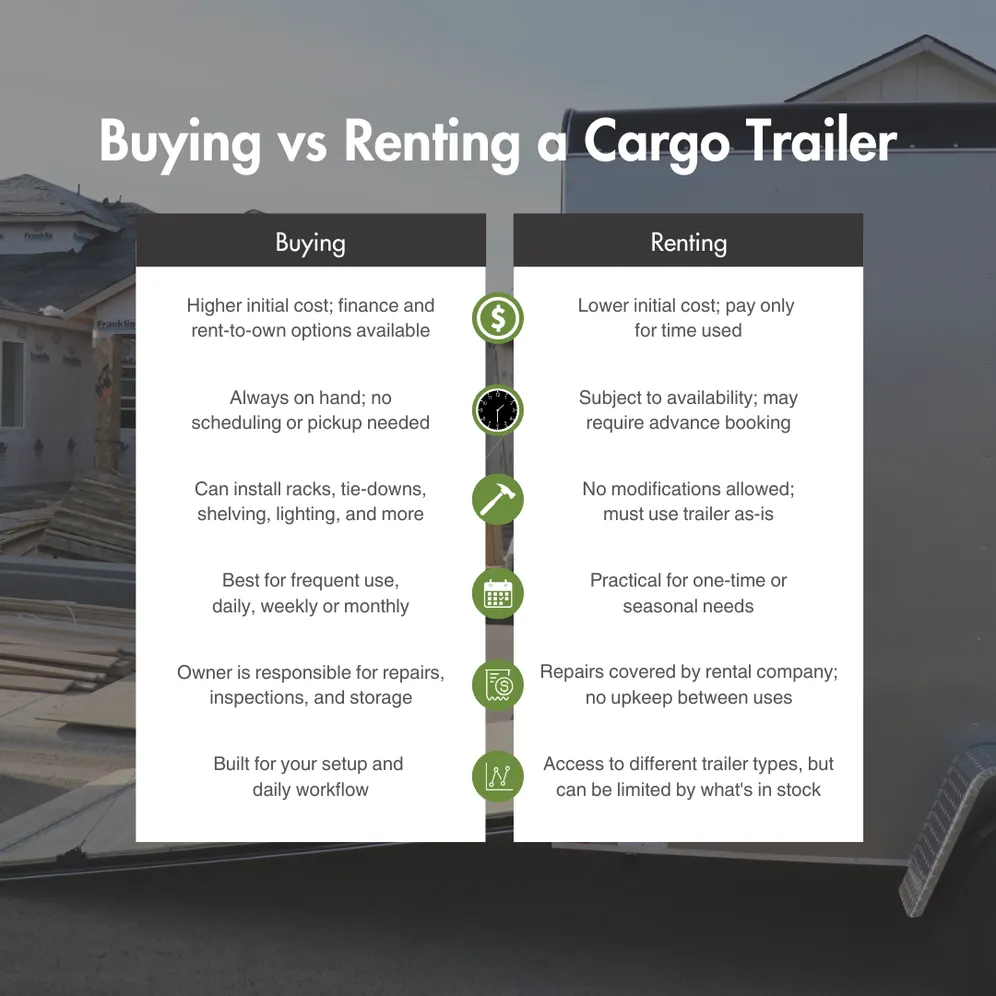If you’re moving tools, hauling equipment, or transporting materials for work or personal use, you’ve probably wondered whether it’s better to buy your own trailer or just rent one when the need comes up. There’s no universal answer—it depends on how often you need it, how much flexibility you want, and whether you're ready to take on the costs that come with ownership.

Cost: How Much Can You Afford to Spend?
Buying a trailer means spending more upfront. Whether you pay in full, finance, or use a rent-to-own program, you’re committing to either a lump sum or monthly payments. But if you plan to use it regularly, that investment usually makes sense. Over time, it’s often cheaper to own than to keep renting, especially if you’re pulling a trailer every week or even a few times a month. You're not just covering your needs—you’re also building equity. At some point, you’ll own it outright, and you can keep using it without additional cost beyond upkeep. If you ever want to upgrade or switch to a different type, you can sell it and get some of that money back.
On the other hand, renting keeps things simple if you don’t use a trailer that often. If your needs are limited to a couple projects per year, like a move, a renovation, or a one-time job, renting makes more sense. You pay for the time you use it and return it when you're done—no payments, no storage, no long-term commitment. The downside is, if you find yourself needing one more often than you expected, those rental fees start to pile up quickly. And when it’s all said and done, there’s no asset to show for what you’ve spent.
Frequency of Use: Occasional Jobs vs. Everyday Hauling
Usage frequency is one of the biggest deciding factors. If you're using a trailer on a schedule—whether it's for work, weekend hauling, or regular property maintenance—owning removes a lot of friction. You don’t have to call ahead, check availability, or work around someone else’s hours. The trailer is there when you need it. You also have the freedom to outfit it exactly how you want. Whether it’s adding interior lighting, E-tracks, ladder racks, toolboxes, or upgraded flooring, owning a trailer means you can install whatever helps you work faster and safer. It becomes a fixed part of your setup—not something you have to adapt to each time.
With a rental, you’re limited to what’s available that day. You can’t modify it or expect it to match your needs every time. If it lacks the features you need—tie-downs, ramps, shelving—you’re forced to make it work. Worse, during busy seasons, the right trailer might not be available at all. That unpredictability adds risk and inconvenience if you’re working on a deadline or coordinating with a crew.
Ownership Responsibilities: Maintenance, Repairs, and Storage
Maintenance and storage are two areas where ownership adds responsibility. When you own a trailer, you’re the one dealing with repairs, tire replacements, brake checks, and registration renewals. You also need to think about where to park it when it's not in use. Some people have space, others don’t. If storage is a problem or you just don’t want to think about upkeep, renting may be the better option. When you rent, those issues shift to the rental company. You don’t deal with worn tires, bad wiring, or expired tags—you pick it up, use it, and drop it off.
Warranty Coverage and Risk of Damage
Warranties are another thing to consider. Most new trailers come with some kind of warranty from the manufacturer. These usually cover defects in materials or workmanship for at least a year, sometimes longer. That can help with repair costs early on and may make resale easier if the warranty is transferable. Rentals don’t come with that benefit, and you’ll likely be responsible for any damage that happens while the trailer’s in your possession, even if it’s minor. Always read the rental agreement carefully so you’re not surprised later.
Long-Term Value: What Will It Cost Over Time?
From a long-term cost standpoint, ownership usually wins—if you’re using the trailer regularly and taking care of it. Trailers hold their value well if maintained properly, and at some point, you’re no longer making payments. Renting avoids depreciation, but you’re also not gaining anything financially. You’re just covering each use with a fresh payment, and that adds up if it becomes a regular thing.
Which Option Fits the Way You Work?
In the end, it comes down to how often you need a trailer and how much control you want. If it’s something you use consistently and you have the means to store and maintain it, buying makes more sense. If your use is limited and occasional, renting keeps things simple without tying you to long-term costs or responsibilities.
If you're ready to buy, choose TrailersPlus. We offer factory-direct trailers, available to you with consistent quality and no dealer markups. Every trailer comes with two free certified inspections post-purchase, manufacturer warranty, and nationwide service support across 80+ locations. Flexible payment options—including traditional financing and rent-to-own options with no credit check—make it easier to get the trailer you need without delays. With full registration assistance, hands-on walkthroughs, and a focus on long-term value, TrailersPlus gives buyers like you a straightforward, reliable way to own a trailer that’s built to last. We’re behind you all the way
Learn more about trailer financing!
Call Us Now 877-850-7587









